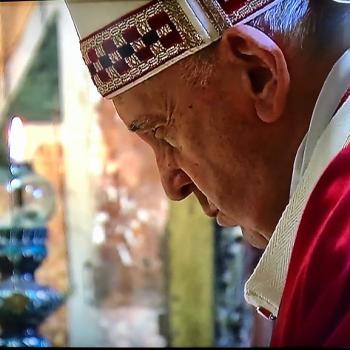Astonished, it led me to an empty, darkened pew to see it for myself. I was, to be sure, not filled with anything that could be called piety, but his example got me there and left me marveling at the display.
No way, I thought. These people actually believe.
Catholic schools are also indispensable because they help students understand the transcendent purpose of their thousands of hours of cramming and test-taking. As one of my colleagues put it, Catholic education responds to the question, "What now?" "Now that we know about the Civil War and World War II, now that we can factor and divide and build and dissect, what do we do with this knowledge? Where should it take me? Whom should I serve, myself or others?"
It is not that secular schools don't address those questions; it's that they do so incompletely, so absolutist are they in their quest to cut God from being taken seriously. Historian Brad Gregory of the University of Notre Dame has written about this gap between secular and religious schools in the spring 2007 issue of Notre Dame Magazine. Comparing his time as a professor at Stanford with his more recent experience at Notre Dame, Gregory wrote:
[I]rreligious and atheistic ideas are discussed at Notre Dame—for if Catholicism is what it claims to be, it should fear no intellectual challenge (can one imagine Aquinas refusing to read Aristotle?). As a result, a wider range of ideas, religious views, and moral and political perspectives can be aired in academic settings without denigration or intimidation at Notre Dame than at leading secular universities.
A high school, of course, lacks the rigor and scope of a university, but a Catholic high school, at its best (and in my experience where I teach) illustrates Gregory's point. A Catholic high school engages young men and women about the full range of human concerns, concerns that cannot fail to invoke the question of God.
Through retreats, furthermore, Catholic high schools sustain students' interior life. Through prayer, discussion, and contemplation, they reflect upon their past, their present, and their future; they recognize threshold moments, acknowledge triumphs, and learn from failures. Retreats are also crucial to psychological health. As every teacher knows, many students come to school bearing deep wounds from all manner of family dysfunction. Alcoholism, divorce, depression, poverty, death: these are a sampling of the burdens that weigh down the sensitive minds in our care. And there is, remarkably often, no person at home helping them to heal their scars. In the quiet space of a retreat, removed from the deadlines and shouting adults, recovery becomes possible.
The above is not exhaustive, and Catholic schools are not perfect. Many words could be written on the fine-tuning, and sometimes outright overhauls, some Catholic schools require, especially in light of the attractive alternatives online and the constant reformations sparked from innovative combinations of technology and curriculum. But whatever reforms are needed, Catholic education, in its incarnational (and Incarnational) emphasis, in its capacity to give meaning to a world always inclined to disorder, in its desire to mend broken hearts and nourish divinely seeded souls: in all this, it remains unique, essential, and salvific. That tuition bill is high, but worth every penny.




